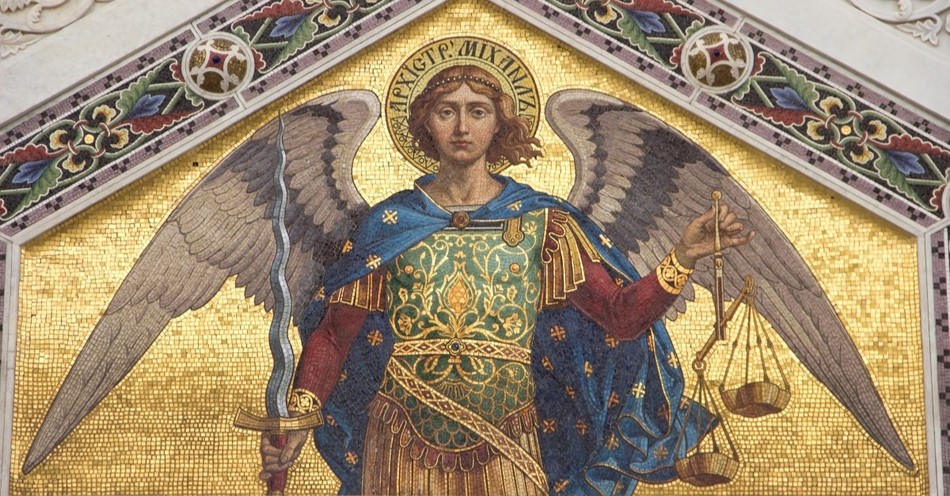Evangelical Christianity emerged and broke away from its more liturgical, Protestant roots. Evangelicals emphasized greater spontaneity in their services. This took many Christians further away from the original liturgies of the Catholic Church.
Over centuries, the Catholic Church developed a legacy of prayers and more to celebrate the faith and pass it down to the next generation. Some of the liturgy comes from sound doctrine and can still encourage people today. Other aspects are based on the kind of teaching that led to the Reformation and important changes. As believers, we must let truth help us distinguish between the two.
One example o this is St. Michael’s Prayer.
What Does St. Michael’s Prayer Say?
St. Michael’s prayer is a famous Catholic invocation for protection from the Devil and evil. The prayer addresses St. Michael the Archangel, a major angelic warrior for God mentioned in the Bible. In Revelation 12:7-9, Michael leads God’s heavenly army against Satan and his fallen angels. Catholics and Christians in other liturgical churches use this prayer to ask for defense against demonic attack.
The most famous version reads as follows:
“St. Michael the Archangel, defend us in battle. Be our protection against the wickedness and snares of the devil. May God rebuke him, we humbly pray; and do thou, O Prince of the Heavenly Host, by the power of God, cast into hell Satan and all the evil spirits who prowl about the world seeking the ruin of souls. Amen.”
The prayer addresses an angel and asks for his protection against the “snares of the devil.” After the initial line, the prayer continues with asking for God to rebuke Satan, although not directly talking to God. Finally, the invocation speaks to Michael again to use the power of God to throw evil spirits into hell, those looking to destroy human souls. The prayer points to the biblical theme of an unseen, spiritual warfare taking place around us all the time. Such great evil can only be conquered by God and his angels.
Catholics pray to saints as intercessors on their behalf. Catholics believe the saints, being in heaven and close to God from their miraculous life on earth, can offer up prayers to him for believers. Catholics teach that asking saints to pray for us is like asking a trusted friend to intercede in prayer. The term “saint” means “holy one,” and in the Old Testament, most “holy one” references mean angels. In the New Testament, a “holy one” is mostly the reborn people of God. Though angels aren’t human, they are powerful beings who serve God. Because of Michael’s special place in the angelic host, Catholics count him as a “saint.”
Over time, St. Michael’s prayer has become a major prayer in the Catholic Church.
How Did St. Michael’s Prayer Develop?
Pope Leo XIII declared he had a frightening vision after Mass in 1884. According to accounts, the Pope fell to the ground and entered some sort of trance. He later described hearing a conversation between Jesus and Satan. In the vision, Satan boasted he could destroy the Catholic Church if given more time and power. Christ gave the Devil fifty years to test the Church. This mystical experience disturbed Leo, and so he wrote a prayer to St. Michael the Archangel to call for heaven’s protection.
It was originally a longer prayer, and it included more graphic and evocative imagery to show Satan’s attack on the Church. In 1886, he added a shorter form of the prayer to be said after Low Mass. This tradition continued until the Second Vatican Council in the 1960s. Most people know and pray the shorter version today.
The Catholic Church officially removed the requirement to say the prayer after Mass during some liturgical reforms in 1964. At the same time, Pope John Paul was devoted to St. Michael as a saint and encouraged people to continue using the prayer in churches and privately, even though no longer a rule for Mass.
In recent years, interest and awareness of spiritual warfare and angels have grown among Catholics and other Christians. As a result, more people have been saying and using the prayer, giving it something of a revival.
What Bible Verses Talk about the Angel Michael?
Besides Revelation 12, the Bible mentions Michael in a few key passages, revealing him as a heavenly warrior for God.
The book of Daniel introduces Michael in biblical history. In Daniel 10:13, Michael arrives as a prince who helps an angel who had been fighting the “prince of Persia.” These “princes” become names for demons or angels and revealed a deeper spiritual battle happening behind political events. Michael helps one of God’s angels overcome demonic opposition. A few verses later, Michael is called “your prince,” a special name to show his role of protection over Israel (Daniel 10:21). The angel talking with Daniel reveals how no one else but Michael helped him.
In Daniel 12:1, Michael appears again during a period of tribulation. The verse calls him “the great prince who stands watch over the sons of your people.” Michael’s arrival brings judgment and hope, even during great distress. Michael fights to guard the faithful, delivering those whose names are written in the book of life.
Jude 1:9 gives an odd picture of Michael fighting with the Devil over Moses’ body. He refuses to rebuke Satan directly, saying, " The Lord rebuke you.” The story references a nonbiblical Jewish source to make a point about spiritual warfare.
The New Testament was powerfully influenced by Daniel, especially Revelation, so it shouldn’t surprise us that Michael shows up to fight Satan for the Church as he did for Israel in Daniel. Looking over these passages, we can see that Pope Leo used these ideas for his famous prayer.
What Makes St. Michael’s Prayer So Powerful for Catholics?
St. Michael’s Prayer gives Catholics a way to directly confront and clearly address the reality of spiritual warfare, calling upon one of God’s most powerful angels. Michael’s name means, “who is like God?” Because of his activity in Revelation 12, Catholics see him as a defender of the Church, the people. Catholics view the prayer as calling on Michael for a specific purpose, not as worshipping him.
The prayer’s power comes from its brevity and clear focus. It doesn’t ask for a vague or general blessing or comfort. It calls on St. Michael for specific protection against Satan. The invocation affirms the reality of the unseen realm and the warfare taking place there. Also, it acknowledges how the unseen has the power to influence believers in the world. The prayer tries to help Catholics resist temptation and fear, reminding them that God’s help is always near.
For those in times of crisis or temptation, the prayer becomes especially meaningful. Many still pray it at the end of Mass during the Eucharistic Adoration, or possibly part of daily devotions when facing hardships or sensing spiritual attacks. Through the prayer, they trust St. Michael to bring heavenly ability and authority to overcome darkness.
As liturgy, St. Michael’s Prayer further connects Catholics to the greater community of faith and church. People in other places say the same prayer, all over the world. This all helps Catholics feel part of a larger expression of their church, helping them see they don’t fight alone. In partnership with other believers, the saints, the angels, and God, they are protected by heaven.
What Does the Bible Say about Praying to Angels?
First, the Bible only teaches believers to pray to God, not to angels or people. Scripturally, prayer is an act of worship, dependence, and relationship with God alone. Throughout the Old and New Testaments, prayer is always directed to the Lord, whether to God the Father (Matthew 6:9), to Jesus (Acts 7:59), or by the Spirit (Romans 8:26). Nowhere does Scripture tell us to address angels in any way, even as supposed “intercessors” on our behalf.
Only Christ stands as our intercessor before God. Scripture teaches how Jesus alone intercedes between the church and the Father. Christ is the High Priest (1 Timothy 2:5; Hebrews 7:25). Jesus prays for us all the time, eternally and continually. We need no other mediator—no saint, angel, or human can take his place. Through Christ, we have direct access to the Father with boldness and confidence (Hebrews 4:14-16). Trusting in him alone honors his finished work and eternal role in our salvation and sustenance. We pray in his name because he alone bridged the gap between us and God, fully God and man, our perfect Advocate.
We pray for one another, surely, and the prayers of righteous people can be powerful (James 5:16). Yet the consistent testimony of the New Testament, what it models, cautions against raising up a person or being above others in any mediator-type role.
The Bible also includes warnings against giving angels reverence. In Revelation 19:10 and 22:8-9, when John bows down to worship an angel, the angel quickly corrects him. “Do not do that. I am a fellow servant … Worship God!” These beings aren’t someone to pray to, but fellow servants. As such, proper servants reject being placed in a role not theirs, refusing worship, redirecting it to God alone.
Paul also warns against those who “delight in false humility and the worship of angels,” saying such people become “disqualified” (Colossians 2:18). The early church grew rapidly and faced false teachings of all kinds, including spiritual movements that treated angels as divine figures like gods, which was common in parts of Judaism and other religions. Paul rejects this. Elevating angels to objects of devotion twists their role and opens people to deception.
This caution is important because Satan himself was once a top angel, but he fell due to his pride, seeking worship and attention for himself (Isaiah 14:12-15; Ezekiel 28:13-17). He even disguises himself as an “angel of light.” (2 Corinthians 11:14) This shows how he can mislead those with his outward appearance. We guard against his deceptions through the Spirit, the work of Christ, and the testimony of Scripture.
Regarding spiritual warfare, the New Testament teaches us to battle our spiritual enemy through faith and dependence upon God. Ephesians 6 describes the spiritual armor of God, calling prayer essential to provide strength in every situation. We stand against these spiritual forces not by physical strength but by truth, righteousness, faith, salvation, and the Word of God. Prayer to God, grounded in the authority of Christ and biblical truth, is our most powerful weapon. These passages don’t include a prayer to an angel as part of spiritual warfare.
While Catholics and some traditions include the intercession of angels or saints, the biblical pattern remains abundantly clear: pray to God alone. Only God hears prayers, answers with truth and wisdom, and commands angels on our behalf. Angels act as God’s servants and warriors, not to substitute our direct relationship with the Father through Christ.
Peace.
Photo credit: ©Studio Images/Getty Images





_639045351253598148.jpg)